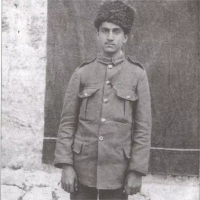
Jerualem, Palestine | Unknown - Unknown
Najati Sidqi, born in Jerusalem in 1905, was a prominent Arab leftist, writer, and translator. His father, Bakr Sidqi, was a teacher and lover of the arts, while his mother, Nazira Murad, was from Jerusalem. Sidqi had one brother, Ahmad. He married a Ukrainian Jewish woman, Lutka, in Russia, and they had two daughters, Dawlat and Hind, and a son, Sa'id. His paternal grandfather, an Ottoman army officer, eventually settled in Jerusalem. Sidqi completed his early education in Jerusalem and moved to Cairo after World War I, where he discovered modern theater. In 1924, after the British occupation of Palestine, he worked in the Department of Posts and Telegraphs and became involved with the communist movement. In 1925, the Palestine Communist Party sent him to Moscow to study at the Communist University for Workers of the East (KUTV). He studied materialist philosophy, political economy, and revolutionary history there and became known internationally as Mustafa Sa'di. In 1929, Sidqi returned to Palestine with his family, tasked with Arabizing the predominantly Jewish Palestine Communist Party. He became a central committee member and contributed to the party's newspaper. In 1931, the British authorities arrested him, sentencing him to two years in prison. After his release, he was sent to Paris in 1933 to edit the Arabic magazine al-Sharq al-Arabi, which was later shut down by the French government. Sidqi then moved to Moscow and Tashkent to study Soviet policies on national issues. In 1936, he was sent to Spain to conduct propaganda among Moroccan troops fighting for Franco. Later, he moved to Algeria and attempted to establish an Arabic radio station. By 1937, Sidqi was in Syria and Lebanon, writing for communist publications. Organizational disputes led to his suspension from party activities, and he turned to journalism, writing for Beirut newspapers and magazines. Critical of the 1939 German-Soviet Nonaggression Pact, he was expelled from the Syro-Lebanese communist party. He returned to Jerusalem, working for the British-run Near East Broadcasting Service, focusing on literature and publishing short stories and translations. After the 1948 Nakba, Sidqi moved to Cyprus and Beirut, continuing his literary career. In 1976, he moved to Athens, where he died in 1979. Sidqi was known for his progressive principles and literary contributions and as a key figure in Arabic realism. He left behind memoirs introduced by Hanna Abu Hanna.